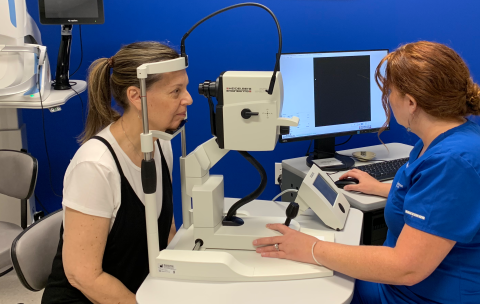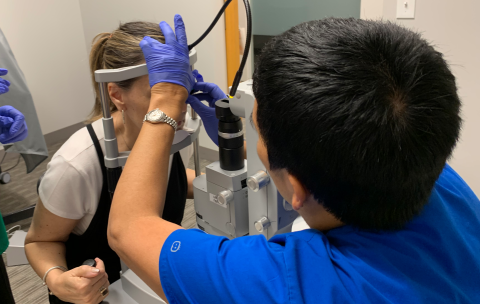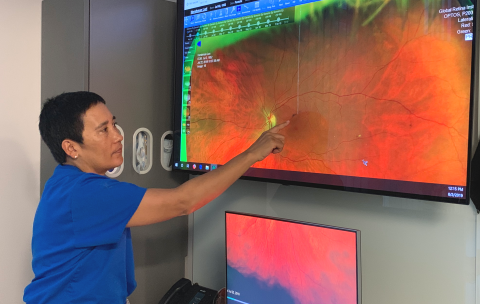What are Eye Floaters?
Our patients’ descriptions of eye floaters sound like one or all of the following:I have a dark spot in my eye or eye spots…
I have eye floaters or black floaters in the eye…
I am seeing dots or spots in my vision…
Types of Eye Floaters
Eye floaters, also called vitreous floaters, or vitreous opacities, are scientifically called “Muscae Volitantes”, Latin for flying flies. They are essentially clumps of cells “floating” in the vitreous of the posterior segment of the eye. The vitreous makes about 75% of the volume of the eye.
These clumps of cells can appear as:
• Black spots or specks
• Squiggly lines or strands
• Cobwebs
• Clouds




Are You Living With Eye Floaters?
For older patients, typically the floater is a cloud form and is called a “Weiss ring”, and is the result of a posterior vitreous detachment, or PVD. This type of floater is most common in patients 55 years and older, and has over a 95% success rate when undergoing Laser Floater Treatment.
Whatever the configuration of solid cells, they usually cast shadows on the retina. This is from the floater obstructing light rays entering the pupil through the visual axis. Floaters can also decrease visual quality and can block portions of your field of vision indefinitely.
An eye floater seen under a microscope
Eye floaters that remain in the field of sight impact patients’ lives very differently. For some, they are an annoyance that can be tolerated. Floaters that remain stationary may be compensated for by our brain and can be ignored perceptually (neuroadaptation).
For many others, eye floaters symptomatically affect quality of life depending on your visual demands. For those of you who live with us in the sunny southwest, floaters are much more noticeable with the typical blue sky we get most days. The light constricts your pupils, amplifying the noticeable effect of your floaters.
If you are having a sudden onset of floaters and/or flashes of light, or a new “curtain” in your vision, you need to see an ophthalmologist immediately, ideally a retina specialist.
An exam is needed to rule out a retinal tear or a retinal detachment, which without prompt and proper treatment can lead to permanent vision loss. Floaters can be a warning of a preventable retinal disease that if left untreated can lead to permanent blindness.
Get the Floaters Fact Sheet
Why Do Floaters Happen?
There is a range of possible causes for eye floaters and they are sometimes an indication of a more serious retinal condition.
While there is not singular cause of eye floaters, the most common cause is aging. As we age, the vitreous (a gel-like structure filling the back of the eye) liquifies and as these liquid pockets or clumps of cells coalesce (syneresis), they create floaters.
Who Gets Eye Floaters?
Eye floaters are most common in adults that are 55 years and older. However they can occur earlier in life if you are nearsighted, also called myopia. Other causes include blunt trauma to one or both eyes or your head such as a concussion.
Another cause of eye floaters includes Uveitis. This is an inflammation of the eye’s uveal tract, which contains most of the eye’s blood vessels. When the tract is affected due to inflammation, blood vessels may leak and cause floaters in the vitreous and reduced vision.
Finally, cataract surgery or LASIK surgery can sometimes accelerate the aging process, or the detachment of the vitreous, both of which can lead to eye floaters.

When Is It Time To Worry?
1
Mild eye floaters (especially in older adults) are to be expected. Mild eye floaters are generally asymptomatic for 95% of people. However when eye floaters first occur an ophthalmic evaluation is still required.
2
If your floaters came on suddenly or multiply suddenly in number or if they impair your vision, you need to see a retinal specialist because it could be a PVD, which can tear the retina or a retinal blood vessel. If the floater contains blood, 85% of the time it is associated with a retinal tear.
3
If you develop floaters and already have lattice degeneration (a thinning of the retina which occurs in 8-10% of the population) or a family history of retinal detachment you should see a doctor right away.
Can Floaters be Treated?
Yes. Eye floaters can be treated in many cases without surgery. You do not necessarily have to live with them. The in-office procedure is called “Laser Floater Treatment” (LFT) or Laser Vitreolysis.
Using the FDA approved Ellex Ultra Q Reflex Laser, the procedure neither removes nor fragments your floaters, but vaporizes them into gas bubbles. These are then absorbed into your bloodstream.
In some cases floater strands are separated from the retina and subsequently drop from the field of sight.
Extreme cases of eye floaters may require a surgical procedure called a vitrectomy.
Contact Us With Any Questions
Are You A Candidate For Laser Floater Treatment?

Meet Our Eye
Floater Specialist

For more than twenty years, Robin Ross MD, MPH, CPH, has specialized in vitreoretinal diseases and surgery. As a board certified ophthalmologist, who is also board certified in public health, her mission is to prevent unnecessary suffering and disability caused by eye diseases.
She currently practices at the Global Retina Institute in Scottsdale Arizona. She is also the Director of Global Health Outreach, and the Director of Ophthalmology Medical Education at the University of Arizona College of Medicine – Phoenix.
“Understanding the spatial context of the vitreous is critical to this treatment. My retinal ophthalmology career has always been in this space, including premature infants.
Eliminating obtrusive floaters has allowed me to help a police officer protect himself, an ER physician stay working, artists capture that magical photo or continue painting, and musicians be able to continue reading sheet music. . Vision is really more than eyesight. Telling patients to simply “live with it” is no longer always necessary.
Much of the artwork hanging in our offices is a reminder that our primary goal is getting people back to seeing clearly to enjoy the beauty in their lives.”
If you have more medical questions for Dr. Ross, you can email her directly here.






Interested in Laser Floater Treatment?
Latest Video Testimonial





